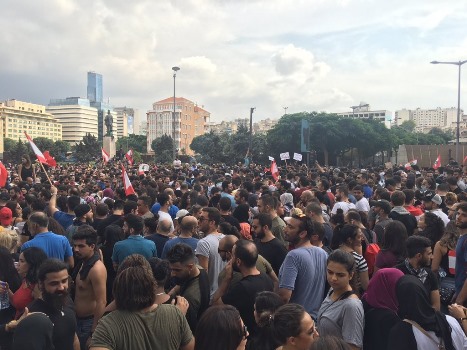
Recent weeks have seen major cities and entire countries around the world shaken by mass revolts. The ruling classes are challenged by populations angry and embittered by combination of threats of oppression, years of austerity, corruption and a widening gap between rich and poor.
In the past few days, Lebanon has joined Hong Kong, Ecuador, Iraq, Egypt, Catalonia and Chile, as places where this international phenomenon erupted. No wonder that the world’s ruling classes and their strategists are fearful of the future. In countries like Nigeria people are jailed just for saying a “revolution” is necessary.
Facing falling living standards, collapsing infrastructure, economic crisis, the threat of austerity and massive corruption led to the first round of protests in a number of cities in Lebanon at the end of September. Significantly, some of those protesting in the capital, Beirut, wore Che Guevara t-shirts and displayed communist symbols.
Tensions were already rising due to an austerity budget, in July, followed by all the governing parties agreeing in September to the “Baabda paper” – essentially another austerity plan. The New York Times revealed that the Lebanese prime minister, Saad Hariri, in 2013, gave a 20 year old South African fashion model over $16 million. This news symbolised the corruption of the extremely wealthy elite. While Hariri, whose wealth was estimated to be $1.6 billion, in 2013, could afford to be so generous to his friends, workers at some of the companies he owned were not being paid their wages.
Mass youth unemployment, standing at 37% of the under 25 year olds, is also a burning issue.
However, the spark that ignited October’s mass revolt, indeed potentially the early stages of a revolution, was an attempt to levy a 20 US cent a day tax on data services, such as WhatsApp. Extremely rapidly the whole country was gripped by protests that echoed to calls for “revolution” and, as in the 2011 ‘April spring’, the chant, “The people want to bring down the regime”. Within days, 20% of the population, 1.3 million people, were participating.
Movement united across sectarian divisions
Significantly, in a country marked by deep divisions between different religions and religious sects, the demonstrations took place under the Lebanese, not party or religious, flags. It was a genuinely united outpouring of anger and frustration at a ‘political class’, generally regarded as a thieves and crooks. The protests are also marked by both the involvement of males and females.
This rebellion cut across the deep religious and ethnic divides which have existed in Lebanon since the modern state was created by French imperialism after the collapse of the Ottoman Empire, at the end of the First World War. The Lebanese state was formed on the basis of an institutionalised form of ‘Identity Politics’. Under the 1926 Lebanese constitution and the 1943 National Pact, seats in the government are divided between Christians and Muslims. Within these two religious blocs, they are then distributed proportionally to the support of the various denominations and sects. Although this setup was presented as a way to avoid division, it actually cemented and deepened the divisions in the country. While both the constitution and the 1989 Taif Agreement, which led to the end of the 1975 to 1990 civil war, mentioned removing this religious foundation, it still remains in place.
But the last weeks showed the potential for united action. Protests took place across the country, uniting Lebanese from every background. A brief attempt at repression failed to halt the movement. The government rapidly offered concessions. Clearly, as the BBC pointed out, the government was biding time, hoping that the movement “will eventually fizzle out”.
The movement has gone beyond protesting at the “WhatsApp” tax. It is now demanding not just the resignation of the government but aiming to end the whole corrupt system.
Many protesters learnt lessons from the 2011 revolutions, particularly what happened in Egypt. There is a widespread demand for complete change, at the very least the clearing out of the corrupt elite, to try to prevent the old order coming back.
At the time of writing, the movement is still continuing but now the key questions are to organise it on a democratic basis, and to decide upon a course of action – a programme – of what needs to be done. To achieve and guarantee the unfolding revolution’s aims, such a programme would need to be based upon the formation of a government of representatives of working people that would take action against the capitalist elite and begin the socialist transformation of the country.
Currently the bulk of the population is united, but there can be no doubt that the rival sectarian leaders will attempt to sow religious and national divisions to divide the movement and regain support. This is a further reason why it is essential to seize the time now to use this opportunity to build a new, genuinely socialist, movement of working people.
Such a movement would have to defend the genuine rights of all nationalities and religions, while working to build and maintain the united action of working people, which is vital in a country like Lebanon. This is also particularly important in order to seek to involve the roughly 1.5 million refugees from the Syrian civil war, who currently make up around a quarter of Lebanon’s current population.
A victory for a socialist revolution in Lebanon would have an electrifying effect, not just in the Middle East but amongst all those struggling in similar battles around the world. In particular, it could help breathe new life into movements in other Middle Eastern countries, and would illustrate the road to travel to secure victory and to prevent counter-revolution. On this basis, it would open the door to a new era without the poverty, corruption, oppression and wars, which have blighted the Middle East.
